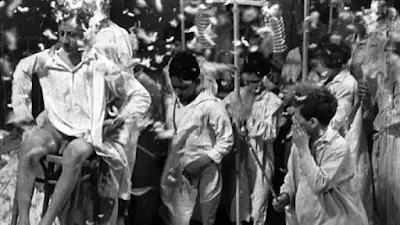Jean Vigo's 1933 film Zero de Conduite (Zero for Conduct) is a bit like that mischievous kid in class who's always getting into trouble but somehow you can't help but like them. It's a playful and insightful look at childhood rebellion, and it sure didn't sit well with the uptight folks back in the day. In fact, it was banned in France until 1946!
The film follows a group of rebellious boys at a boarding school who are constantly pushing the limits and challenging the rules. Their pranks and mischief get them into hot water with the school's stuffy staff, but these boys aren't about to let anyone stifle their spirits.
Vigo's direction is both lighthearted and thought-provoking, capturing the essence of childhood with a blend of humor, pathos, and social commentary.
The film's rough edges, a result of Vigo's inexperience as a director, only add to its charm and authenticity.
The film's rough edges, a result of Vigo's inexperience as a director, only add to its charm and authenticity.
The story unfolds without much fanfare, and we're quickly drawn into the world of these restless boys. As they return to school after the holidays, we can almost feel their boredom and frustration.
The school is a rigid, oppressive environment, ruled by humorless adults who seem more concerned with maintaining order than actually caring for their students.
Our heroes, however, find solace in each other's company, and their rebellious spirit keeps them going. They plot pranks, engage in pillow fights, and even take over the school rooftop, hurling objects down at a row of mannequins representing the school board.
Their antics aren't meant to be malicious; they're simply a way to express themselves and break free from the suffocating constraints of their surroundings. Vigo beautifully captures the resilience and optimism of youth, even in the face of adversity.
Zero de Conduite is a classic film that has inspired generations of filmmakers with its rebellious spirit and unconventional style. It's a reminder that even in the face of authority, the human spirit can find a way to shine through.

